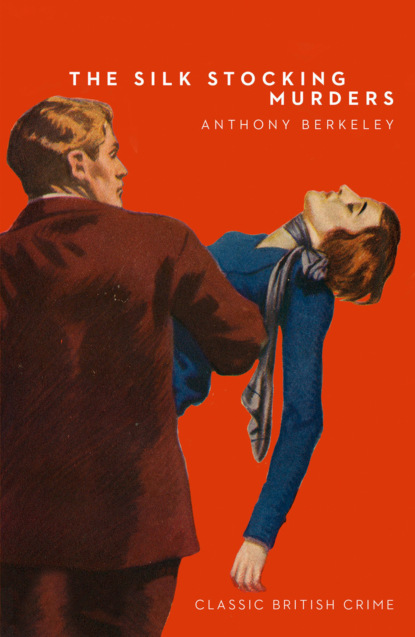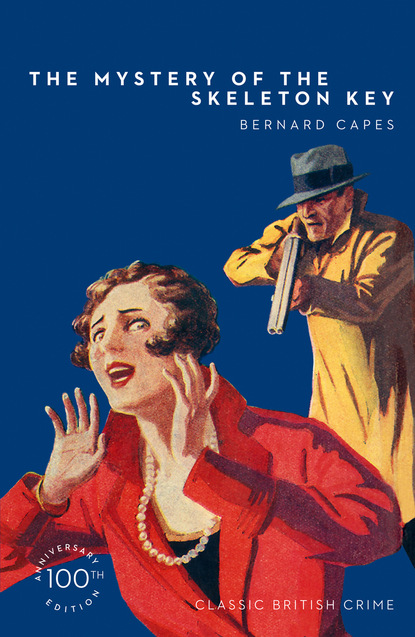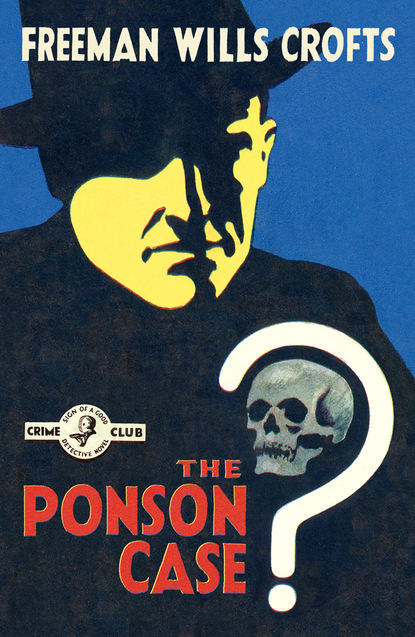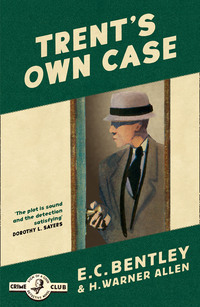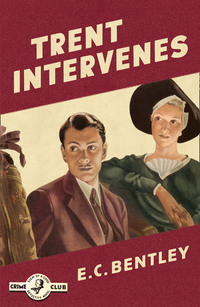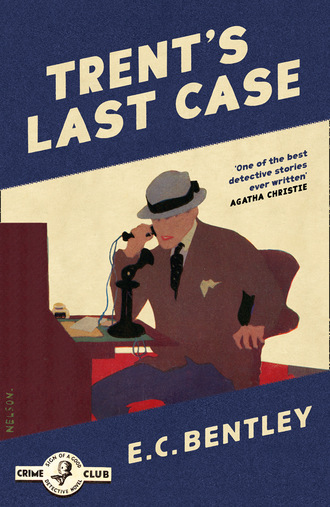
Полная версия
Trent’s Last Case
‘But not false teeth. You ask anybody who wears them. And besides, I’m told he hadn’t washed at all on getting up, which in a neat man looks like his being in a violent hurry from the beginning. And here’s another thing. One of his waistcoat pockets was lined with wash-leather for the reception of his gold watch. But he had put his watch into the pocket on the other side. Anybody who has settled habits can see how odd that is. The fact is, there are signs of great agitation and haste, and there are signs of exactly the opposite. For the present I am not guessing. I must reconnoitre the ground first, if I can manage to get the right side of the people of the house.’ Trent applied himself again to his breakfast.
Mr Cupples smiled at him benevolently. ‘That is precisely the point,’ he said, ‘on which I can be of some assistance to you.’ Trent glanced up in surprise. ‘I told you I half expected you. I will explain the situation. Mrs Manderson, who is my niece—’
‘What!’ Trent laid down his knife and fork with a clash. ‘Cupples, you are jesting with me.’
‘I am perfectly serious, Trent, really,’ returned Mr Cupples earnestly. ‘Her father, John Peter Domecq, was my wife’s brother. I never mentioned my niece or her marriage to you before, I suppose. To tell the truth, it has always been a painful subject to me, and I have avoided discussing it with anybody. To return to what I was about to say: last night, when I was over at the house—by the way, you can see it from here. You passed it in the car.’ He indicated a red roof among poplars some three hundred yards away, the only building in sight that stood separate from the tiny village in the gap below them.
‘Certainly I did,’ said Trent. ‘The manager told me all about it, among other things, as he drove me in from Bishopsbridge.’
‘Other people here have heard of you and your performances,’ Mr Cupples went on. ‘As I was saying, when I was over there last night, Mr Bunner, who is one of Manderson’s two secretaries, expressed a hope that the Record would send you down to deal with the case, as the police seemed quite at a loss. He mentioned one or two of your past successes, and Mabel—my niece—was interested when I told her afterwards. She is bearing up wonderfully well, Trent; she has remarkable fortitude of character. She said she remembered reading your articles about the Abinger case. She has a great horror of the newspaper side of this sad business, and she had entreated me to do anything I could to keep journalists away from the place—I’m sure you can understand her feeling, Trent; it isn’t really any reflection on that profession. But she said you appeared to have great powers as a detective, and she would not stand in the way of anything that might clear up the crime. Then I told her you were a personal friend of mine, and gave you a good character for tact and consideration of others’ feelings; and it ended in her saying that, if you should come, she would like you to be helped in every way.’
Trent leaned across the table and shook Mr Cupples by the hand in silence. Mr Cupples, much delighted with the way things were turning out, resumed:
‘I spoke to my niece on the telephone only just now, and she is glad you are here. She asks me to say that you may make any enquiries you like, and she puts the house and grounds at your disposal. She had rather not see you herself; she is keeping to her own sitting-room. She has already been interviewed by a detective officer who is there, and she feels unequal to any more. She adds that she does not believe she could say anything that would be of the smallest use. The two secretaries and Martin, the butler (who is a most intelligent man), could tell you all you want to know, she thinks.’
Trent finished his breakfast with a thoughtful brow. He filled a pipe slowly, and seated himself on the rail of the veranda. ‘Cupples,’ he said quietly, ‘is there anything about this business that you know and would rather not tell me?’
Mr Cupples gave a slight start, and turned an astonished gaze on the questioner. ‘What do you mean?’ he said.
‘I mean about the Mandersons. Look here! Shall I tell you a thing that strikes me about this affair at the very beginning? Here’s a man suddenly and violently killed, and nobody’s heart seems to be broken about it, to say the least. The manager of this hotel spoke to me about him as coolly as if he’d never set eyes on him, though I understand they’ve been neighbours every summer for some years. Then you talk about the thing in the coldest of blood. And Mrs Manderson—well, you won’t mind my saying that I have heard of women being more cut up about their husbands being murdered than she seems to be. Is there something in this, Cupples, or is it my fancy? Was there something queer about Manderson? I travelled on the same boat with him once, but never spoke to him. I only know his public character, which was repulsive enough. You see, this may have a bearing on the case; that’s the only reason why I ask.’
Mr Cupples took time for thought. He fingered his sparse beard and looked out over the sea. At last he turned to Trent. ‘I see no reason,’ he said, ‘why I shouldn’t tell you as between ourselves, my dear fellow. I need not say that this must not be referred to, however distantly. The truth is that nobody really liked Manderson; and I think those who were nearest to him liked him least.’
‘Why?’ the other interjected.
‘Most people found a difficulty in explaining why. In trying to account to myself for my own sensations, I could only put it that one felt in the man a complete absence of the sympathetic faculty. There was nothing outwardly repellent about him. He was not ill-mannered, or vicious, or dull—indeed, he could be remarkably interesting. But I received the impression that there could be no human creature whom he would not sacrifice in the pursuit of his schemes, in his task of imposing himself and his will upon the world. Perhaps that was fanciful, but I think not altogether so. However, the point is that Mabel, I am sorry to say, was very unhappy. I am nearly twice your age, my dear boy, though you always so kindly try to make me feel as if we were contemporaries—I am getting to be an old man, and a great many people have been good enough to confide their matrimonial troubles to me; but I never knew another case like my niece’s and her husband’s. I have known her since she was a baby, Trent, and I know—you understand, I think, that I do not employ that word lightly—I know that she is as amiable and honourable a woman, to say nothing of her other good gifts, as any man could wish. But Manderson, for some time past, had made her miserable.’
‘What did he do?’ asked Trent, as Mr Cupples paused.
‘When I put that question to Mabel, her words were that he seemed to nurse a perpetual grievance. He maintained a distance between them, and he would say nothing. I don’t know how it began or what was behind it; and all she would tell me on that point was that he had no cause in the world for his attitude. I think she knew what was in his mind, whatever it was; but she is full of pride. This seems to have gone on for months. At last, a week ago, she wrote to me. I am the only near relative she has. Her mother died when she was a child; and after John Peter died I was something like a father to her until she married—that was five years ago. She asked me to come and help her, and I came at once. That is why I am here now.’
Mr Cupples paused and drank some tea. Trent smoked and stared out at the hot June landscape.
‘I would not go to White Gables,’ Mr Cupples resumed. ‘You know my views, I think, upon the economic constitution of society, and the proper relationship of the capitalist to the employee, and you know, no doubt, what use that person made of his vast industrial power upon several very notorious occasions. I refer especially to the trouble in the Pennsylvania coal-fields, three years ago. I regarded him, apart from all personal dislike, in the light of a criminal and a disgrace to society. I came to this hotel, and I saw my niece here. She told me what I have more briefly told you. She said that the worry and the humiliation of it, and the strain of trying to keep up appearances before the world, were telling upon her, and she asked for my advice. I said I thought she should face him and demand an explanation of his way of treating her. But she would not do that. She had always taken the line of affecting not to notice the change in his demeanour, and nothing, I knew, would persuade her to admit to him that she was injured, once pride had led her into that course. Life is quite full, my dear Trent,’ said Mr Cupples with a sigh, ‘of these obstinate silences and cultivated misunderstandings.’
‘Did she love him?’ Trent enquired abruptly. Mr Cupples did not reply at once. ‘Had she any love left for him?’ Trent amended.
Mr Cupples played with his teaspoon. ‘I am bound to say,’ he answered slowly, ‘that I think not. But you must not misunderstand the woman, Trent. No power on earth would have persuaded her to admit that to anyone—even to herself, perhaps—so long as she considered herself bound to him. And I gather that, apart from this mysterious sulking of late, he had always been considerate and generous.’
‘You were saying that she refused to have it out with him.’
‘She did,’ replied Mr Cupples. ‘And I knew by experience that it was quite useless to attempt to move a Domecq where the sense of dignity was involved. So I thought it over carefully, and next day I watched my opportunity and met Manderson as he passed by this hotel. I asked him to favour me with a few minutes’ conversation, and he stepped inside the gate down there. We had held no communication of any kind since my niece’s marriage, but he remembered me, of course. I put the matter to him at once and quite definitely. I told him what Mabel had confided to me. I said that I would neither approve nor condemn her action in bringing me into the business, but that she was suffering, and I considered it my right to ask how he could justify himself in placing her in such a position.’
‘And how did he take that?’ said Trent, smiling secretly at the landscape. The picture of this mildest of men calling the formidable Manderson to account pleased him.
‘Not very well,’ Mr Cupples replied sadly. ‘In fact, far from well. I can tell you almost exactly what he said—it wasn’t much. He said, “See here, Cupples, you don’t want to butt in. My wife can look after herself. I’ve found that out, along with other things.” He was perfectly quiet—you know he was said never to lose control of himself—though there was a light in his eyes that would have frightened a man who was in the wrong, I dare say. But I had been thoroughly roused by his last remark, and the tone of it, which I cannot reproduce. You see,’ said Mr Cupples simply, ‘I love my niece. She is the only child that there has been in our—in my house. Moreover, my wife brought her up as a girl, and any reflection on Mabel I could not help feeling, in the heat of the moment, as an indirect reflection upon one who is gone.’
‘You turned upon him,’ suggested Trent in a low tone. ‘You asked him to explain his words.’
‘That is precisely what I did,’ said Mr Cupples. ‘For a moment he only stared at me, and I could see a vein on his forehead swelling—an unpleasant sight. Then he said quite quietly, “This thing has gone far enough, I guess,” and turned to go.’
‘Did he mean your interview?’ Trent asked thoughtfully.
‘From the words alone you would think so,’ Mr Cupples answered. ‘But the way in which he uttered them gave me a strange and very apprehensive feeling. I received the impression that the man had formed some sinister resolve. But I regret to say I had lost the power of dispassionate thought. I fell into a great rage’—Mr Cupples’s tone was mildly apologetic—‘and said a number of foolish things. I reminded him that the law allowed a measure of freedom to wives who received intolerable treatment. I made some utterly irrelevant references to his public record, and expressed the view that such men as he were unfit to live. I said these things, and others as ill-considered, under the eyes, and very possibly within earshot, of half a dozen persons sitting on this veranda. I noticed them, in spite of my agitation, looking at me as I walked up to the hotel again after relieving my mind for it undoubtedly did relieve it,’ sighed Mr Cupples, lying back in his chair.
‘And Manderson? Did he say no more?’
‘Not a word. He listened to me with his eyes on my face, as quiet as before. When I stopped he smiled very slightly, and at once turned away and strolled through the gate, making for White Gables.’
‘And this happened—?’
‘On the Sunday morning.’
‘Then I suppose you never saw him alive again?’
‘No,’ said Mr Cupples. ‘Or rather yes—once. It was later in the day, on the golf-course. But I did not speak to him. And next morning he was found dead.’
The two regarded each other in silence for a few moments. A party of guests who had been bathing came up the steps and seated themselves, with much chattering, at a table near them. The waiter approached. Mr Cupples rose, and, taking Trent’s arm, led him to a long tennis-lawn at the side of the hotel.
‘I have a reason for telling you all this,’ began Mr Cupples as they paced slowly up and down.
‘Trust you for that,’ rejoined Trent, carefully filling his pipe again. He lit it, smoked a little, and then said, ‘I’ll try and guess what your reason is, if you like.’
Mr Cupples’s face of solemnity relaxed into a slight smile. He said nothing.
‘You thought it possible,’ said Trent meditatively ‘—may I say you thought it practically certain?—that I should find out for myself that there had been something deeper than a mere conjugal tiff between the Mandersons. You thought that my unwholesome imagination would begin at once to play with the idea of Mrs Manderson having something to do with the crime. Rather than that I should lose myself in barren speculations about this, you decided to tell me exactly how matters stood, and incidentally to impress upon me, who know how excellent your judgement is, your opinion of your niece. Is that about right?’
‘It is perfectly right. Listen to me, my dear fellow,’ said Mr Cupples earnestly, laying his hand on the other’s arm. ‘I am going to be very frank. I am extremely glad that Manderson is dead. I believe him to have done nothing but harm in the world as an economic factor. I know that he was making a desert of the life of one who was like my own child to me. But I am under an intolerable dread of Mabel being involved in suspicion with regard to the murder. It is horrible to me to think of her delicacy and goodness being in contact, if only for a time, with the brutalities of the law. She is not fitted for it. It would mark her deeply. Many young women of twenty-six in these days could face such an ordeal, I suppose. I have observed a sort of imitative hardness about the products of the higher education of women today which would carry them through anything, perhaps.
‘I am not prepared to say it is a bad thing in the conditions of feminine life prevailing at present. Mabel, however, is not like that. She is as unlike that as she is unlike the simpering misses that used to surround me as a child. She has plenty of brains; she is full of character; her mind and her tastes are cultivated; but it is all mixed up’—Mr Cupples waved his hands in a vague gesture—‘with ideals of refinement and reservation and womanly mystery. I fear she is not a child of the age. You never knew my wife, Trent. Mabel is my wife’s child.’
The younger man bowed his head. They paced the length of the lawn before he asked gently, ‘Why did she marry him?’
‘I don’t know,’ said Mr Cupples briefly.
‘Admired him, I suppose,’ suggested Trent.
Mr Cupples shrugged his shoulders. ‘I have been told that a woman will usually be more or less attracted by the most successful man in her circle. Of course we cannot realise how a wilful, dominating personality like his would influence a girl whose affections were not bestowed elsewhere; especially if he laid himself out to win her. It is probably an overwhelming thing to be courted by a man whose name is known all over the world. She had heard of him, of course, as a financial great power, and she had no idea—she had lived mostly among people of artistic or literary propensities—how much soulless inhumanity that might involve. For all I know, she has no adequate idea of it to this day. When I first heard of the affair the mischief was done, and I knew better than to interpose my unsought opinions. She was of age, and there was absolutely nothing against him from the conventional point of view. Then I dare say his immense wealth would cast a spell over almost any woman. Mabel had some hundreds a year of her own; just enough, perhaps, to let her realise what millions really meant. But all this is conjecture. She certainly had not wanted to marry some scores of young fellows who to my knowledge had asked her; and though I don’t believe, and never did believe, that she really loved this man of forty-five, she certainly did want to marry him. But if you ask me why, I can only say I don’t know.’
Trent nodded, and after a few more paces looked at his watch. ‘You’ve interested me so much,’ he said, ‘that I had quite forgotten my main business. I mustn’t waste my morning. I am going down the road to White Gables at once, and I dare say I shall be poking about there until midday. If you can meet me then, Cupples, I should like to talk over anything I find out with you, unless something detains me.’
‘I am going for a walk this morning,’ Mr Cupples replied. ‘I meant to have luncheon at a little inn near the golf-course, The Three Tuns. You had better join me there. It’s further along the road, about a quarter of a mile beyond White Gables. You can just see the roof between those two trees. The food they give one there is very plain, but good.’
‘So long as they have a cask of beer,’ said Trent, ‘they are all right. We will have bread and cheese, and oh, may Heaven our simple lives prevent from luxury’s contagion, weak and vile! Till then, goodbye.’ He strode off to recover his hat from the veranda, waved it to Mr Cupples, and was gone.
The old gentleman, seating himself in a deck-chair on the lawn, clasped his hands behind his head and gazed up into the speckless blue sky. ‘He is a dear fellow,’ he murmured. ‘The best of fellows. And a terribly acute fellow. Dear me! How curious it all is!’
Конец ознакомительного фрагмента.
Текст предоставлен ООО «ЛитРес».
Прочитайте эту книгу целиком, купив полную легальную версию на ЛитРес.
Безопасно оплатить книгу можно банковской картой Visa, MasterCard, Maestro, со счета мобильного телефона, с платежного терминала, в салоне МТС или Связной, через PayPal, WebMoney, Яндекс.Деньги, QIWI Кошелек, бонусными картами или другим удобным Вам способом.


